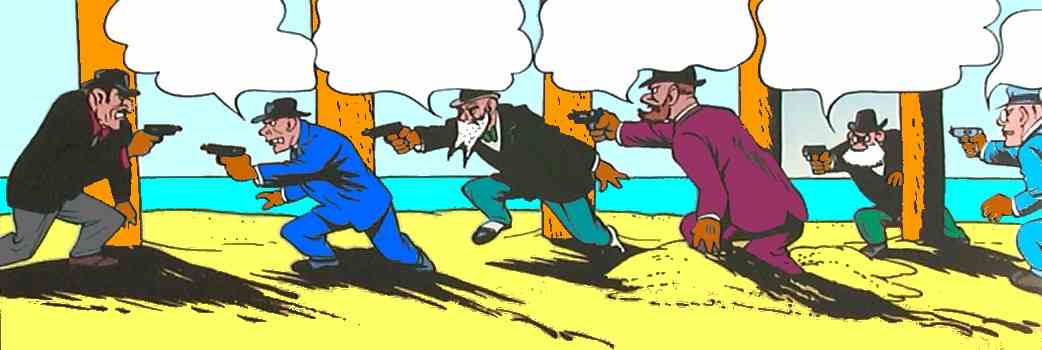

Carl Barks made all of his comic book stories from the Disney universe in the reclusiveness of his home. This meant that he did not always get the same amount of technical and administrational input that the artists working in the employer Western Publishing's house received, and this was also true as for Western's changes in overall policies. The most striking example was the introduction of a new moral code induced by a general hysteria in certain American parties, that aimed to protect young comic book readers from controversial subjects and ideas. This movement grew during the first half of the 1950s, and in 1955 Western management felt compelled to limit themselves by issuing a set of rules that accommodated the ongoing campaign. At the same time they - reluctantly - started to publish a so-called Pledge to Parents* in all their comic book publications.
But the moral code, called Hints
on Writing for Dell Comics, was kept within
Western's own ranks. It contained a long list of subjects that
from now on would be taboo in their comic book stories, but Barks
nevertheless kept on making stories that sometimes conflicted
with the new guidelines. He was not being headstrong or
indifferent to the alterations; he was simply not informed! In a
later interview Barks stated: Western didn't
give me much direction. It was years later after I had made a few
mistakes that I found out that they had a list of taboos. Alice
Cobb (one of Western's editors - Editor's
remark) got me the sheet one time and showed
it to me. You couldn't use the word Kill or use a gun in a
dangerous way, and you couldn't have poison or sickness or
crippled people.
This led to a strange turn of events where Barks continued making
his stories as he pleased, and it was only on very rare occasions
that his editors would intervene and ask him to alter certain
panels or passages. Below you will be presented to single panels,
in which Barks unwittingly overstepped his boundaries. The
tabooed subjects - many of which seem quite harmless today - are
presented as both explicit and contiguous examples.
NO CROOKED LAWMEN |
NO EXCESSIVE REVENGE |
NO KIDNAPPING (NO ABDUCTION) |
NO JEALOUSY |
NO MENTIONING OF MORTALITY |
 NO BLACKMAIL |
NO (MENTIONING OF) DEATH |
 NO REAL PEOPLE |
NO DRUGS |
NO INTERNATIONAL INTRIGUES |
|
NO HORROR |
 NO AFFLICTIONS |
NO ADULT THEMES (NO SEX) |
NO SMOKING |
NO (REALISTIC) POVERTY |
NO TORTURE |
 NO DANGEROUS WEAPON HANDLING |
NO PLAYING HOOKY |
 NO SUICIDE |
NO DRINKING (NO ALCOHOL) |
 NO CROOKED (OR STUPID) LAWYERS |
NO EXCESSIVE HARASSMENT |
 NO PURE EVIL |
NO ANIMAL CRUELTY |
NO SNAKES |
NO VAGRANCY |
 NO UNNECCESSARY PAIN |
NO ATOM BOMB |
 NO FEMALE VILLAINS |
... and there were many more such as: NO SLANG Barks violated most of these listed taboos as well... |
| * PLEDGE TO PARENTS | |||
|
| http://www.cbarks.dk/THETABOOS.htm | Date 2012-03-09 |